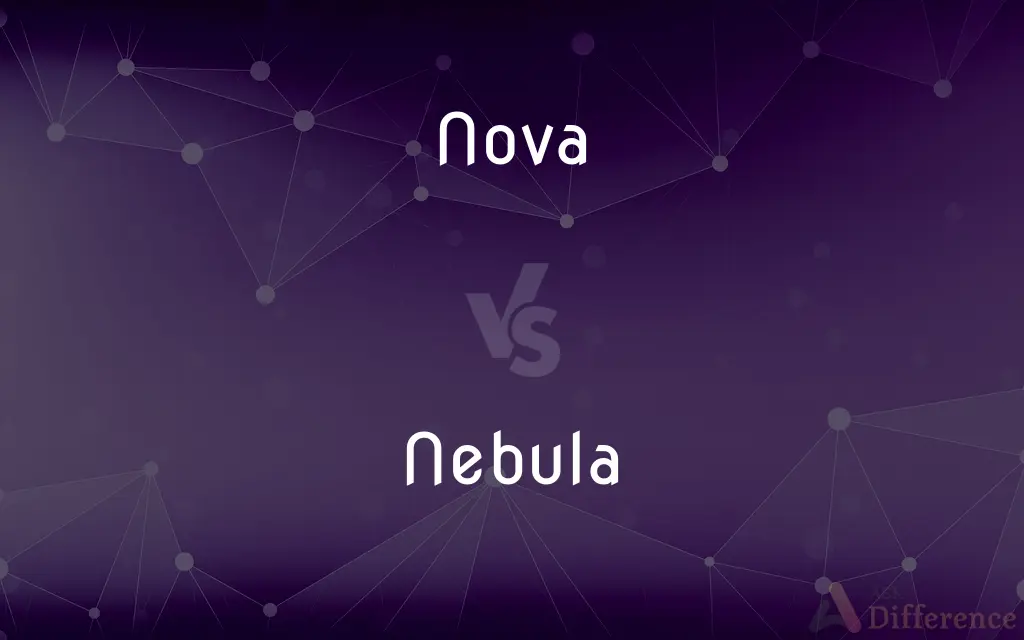Nova vs. Nebula — What's the Difference?

Difference Between Nova and Nebula
ADVERTISEMENT
Compare with Definitions
Nova
A nova (plural novae or novas) is a transient astronomical event that causes the sudden appearance of a bright, apparently "new" star, that slowly fades over several weeks or many months. Causes of the dramatic appearance of a nova vary, depending on the circumstances of the two progenitor stars.
Nebula
A nebula (Latin for 'cloud' or 'fog'; pl. nebulae, nebulæ or nebulas) is an interstellar cloud of dust, hydrogen, helium and other ionized gases.
Nova
Salmon that has been lightly cured and smoked. Also called Nova lox.
Nebula
A cloud of gas and dust in outer space, visible in the night sky either as an indistinct bright patch or as a dark silhouette against other luminous matter.
Nova
A star that suddenly increases in luminosity and then gradually returns to its original brightness over a period of weeks to years.
ADVERTISEMENT
Nebula
A clouded spot on the cornea causing defective vision.
Nova
(astronomy) Any sudden brightening of a previously inconspicuous star.
Nebula
A diffuse cloud of interstellar dust or gas or both, visible as luminous patches or areas of darkness depending on the way the mass absorbs or reflects incident light or emits its own light.
Nova
A star which suddenly increases in brightness thousands of times, then fades back to near its original intensity. It may appear as a "new" star if its original brightness was too low for routine observation. A star which suddenly increases in brightness to many millions of times its original intensity is a supernova, and the postulated mechanisms for the increases of brightness of novae and supernovae are different.
Nebula
A galaxy. No longer in technical use.
Nova
A star that ejects some of its material in the form of a cloud and become more luminous in the process
Nebula
A cloudy spot on the cornea.
Nebula
A liquid preparation for use in a nebulizer.
Nebula
(astronomy) A cloud in outer space consisting of gas or dust (e.g. a cloud formed after a star explodes).
Nebula
A white spot or slight opacity of the cornea.
Nebula
A cloudy appearance in the urine.
Nebula
A faint, cloudlike, self-luminous mass of matter situated beyond the solar system among the stars. The term was originally applied to any diffuse luminous region. Now, technically, it is applied to interstellar clouds of dust and gases (diffuse nebula). However distant galaxies and very distant star clusters often appear like them in the telescope, such as the spiral nebula in Andromeda, known now to be a distant galaxy.
Nebula
A white spot or a slight opacity of the cornea.
Nebula
A medicinal liquid preparation intended for use in an atomizer
Nebula
Cloudiness of the urine
Nebula
An immense cloud of gas (mainly hydrogen) and dust in interstellar space
Nebula
(pathology) a faint cloudy spot on the cornea
Share Your Discovery

Previous Comparison
Grateful vs. Great
Next Comparison
Vomit vs. Excrement













































